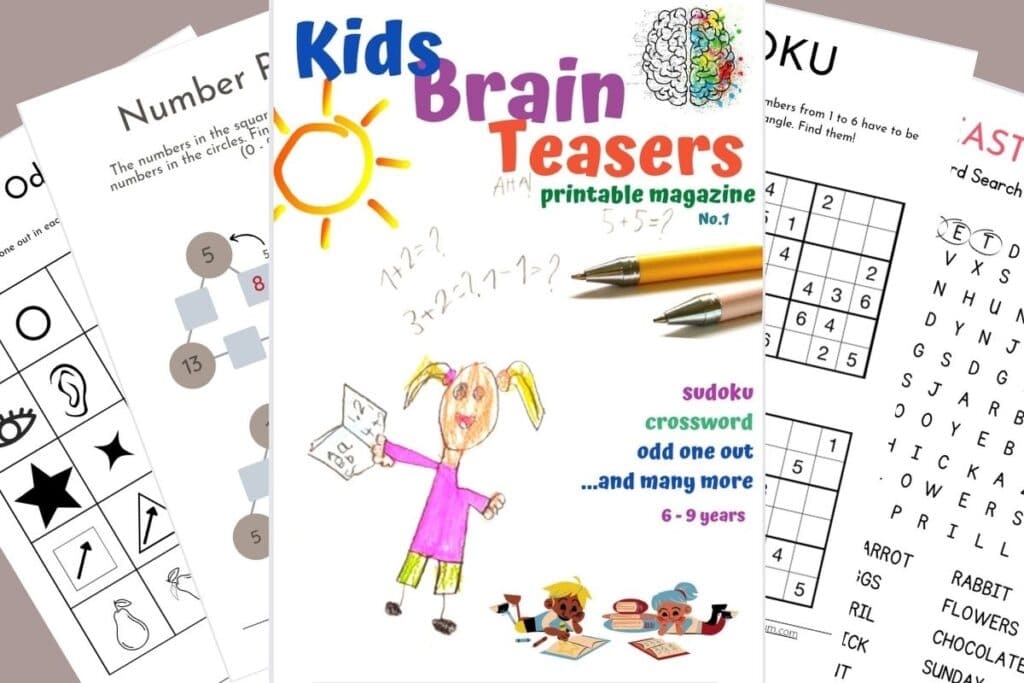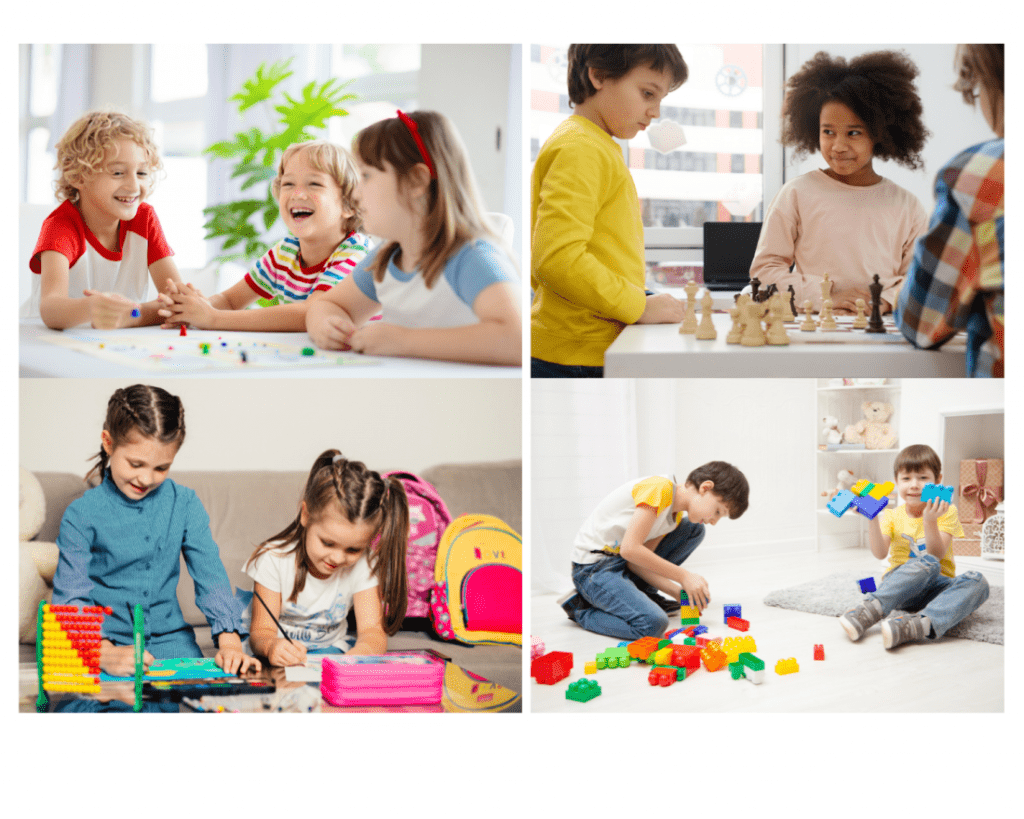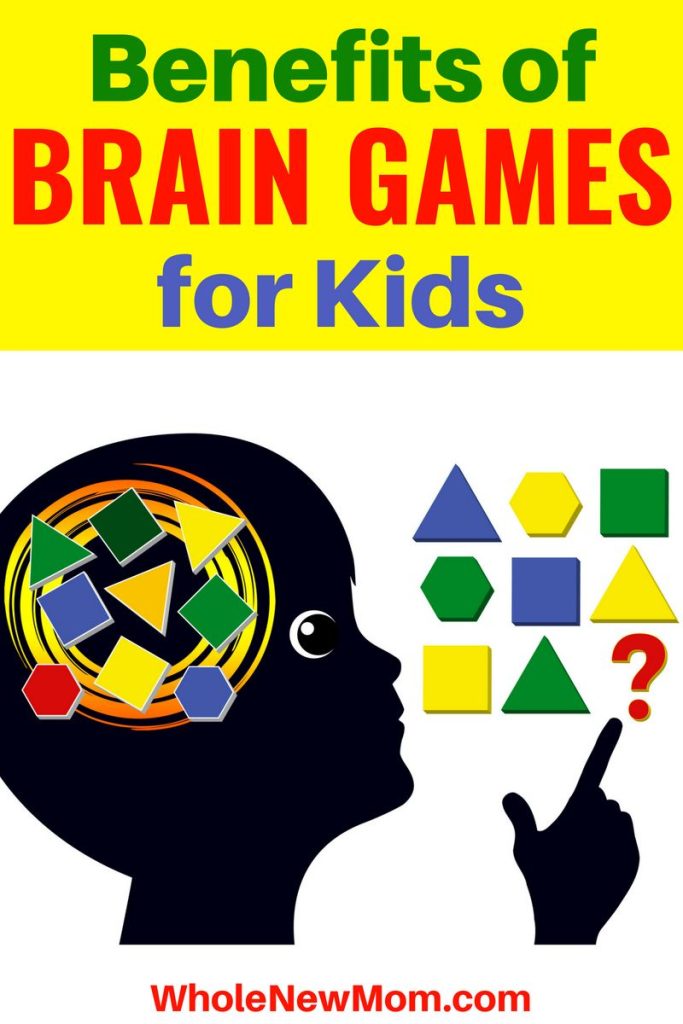In this article, we’ll be discussing the cognitive benefits of brain games for kids. We’ll explore the science behind these games and how they can effectively enhance cognitive skills in children. By the end of this article, you’ll have a better understanding of why brain games are beneficial for kids and how they can positively impact their cognitive development. So let’s dive in and explore this fascinating topic together!

Introduction
Importance of cognitive development in children
Cognitive development is crucial for children as it forms the foundation for their overall growth and learning. It refers to the development and improvement of various cognitive processes such as memory, problem-solving, critical thinking, attention, and focus. These skills are not only vital for academic success but also for everyday life. As a parent or educator, you play a vital role in promoting cognitive development in children. One effective way to enhance their cognitive abilities is by introducing them to brain games specifically designed for kids.
Introduction to brain games for kids
Brain games, also known as cognitive games, are designed to stimulate brain activity and challenge various cognitive skills in a fun and interactive manner. These games are not only enjoyable but also provide numerous benefits for children’s cognitive development. They come in various forms such as puzzles, memory games, strategy games, and logic games. By engaging in brain games, children can improve their memory, problem-solving abilities, critical thinking, attention, and focus. In this article, we will explore the cognitive benefits of brain games for kids and how they can be incorporated into their education.
Understanding Cognitive Benefits
Enhancement of memory skills
Memory is a fundamental cognitive function that plays a vital role in learning. Brain games can significantly improve children’s memory skills by challenging them to remember patterns, sequences, and information. These games stimulate the brain’s hippocampus, the region responsible for memory formation and retrieval. By regularly engaging in memory-based brain games, children can enhance their short-term and long-term memory abilities, which can greatly aid their academic performance.
Improvement in problem-solving abilities
Problem-solving is another essential cognitive skill that children need to develop. Brain games often require children to think critically and find solutions to various challenges. These games encourage them to analyze problems, think creatively, and develop effective strategies. By regularly engaging in problem-solving brain games, children will become better at identifying and solving complex problems, a skill that is essential for success both in and out of the classroom.
Development of critical thinking
Critical thinking involves analyzing information, making logical connections, and evaluating evidence to make informed decisions. Brain games provide an excellent platform for children to develop and enhance critical thinking skills. These games often present children with puzzles or scenarios that require them to think critically and make reasoned judgments. By engaging in brain games regularly, children can improve their ability to think critically and make well-reasoned decisions, which are crucial for success in academics and everyday life.
Enhancement of attention and focus
Building and sustaining attention and focus is a vital skill for children’s learning and overall cognitive development. Brain games require children to concentrate and pay attention to details, which helps strengthen their ability to focus. These games often present children with challenging tasks that require sustained mental effort and concentration. By regularly engaging in brain games, children can improve their attention span and focus, enabling them to better concentrate on academic tasks and other activities that require sustained mental effort.
Types of Brain Games
Puzzle-solving games
Puzzle-solving games are excellent for developing problem-solving and critical thinking skills. These games often involve arranging pieces or solving challenges to complete a picture or solve a problem. Puzzle-solving games help children develop spatial reasoning, logical thinking, and pattern recognition abilities. They are available in various formats, including jigsaw puzzles, tangrams, and block puzzles.
Memory and matching games
Memory and matching games are designed to enhance children’s memory skills. These games involve flipping cards or tiles to find matches or remember patterns. Memory and matching games challenge children to remember the location of various items, which boosts their short-term and long-term memory abilities. Additionally, these games improve focus, attention to detail, and visual discrimination skills.
Strategy and logic games
Strategy and logic games require children to think strategically, plan ahead, and make logical decisions. These games often involve problem-solving, critical thinking, and decision-making in order to achieve specific goals. Strategy and logic games, such as chess or strategy board games, help children develop strategic thinking, logical reasoning, and analytical skills. These games also promote perseverance and the ability to learn from mistakes.
Effectiveness of Brain Games
Research studies supporting cognitive benefits
Numerous research studies have shown the positive cognitive benefits of brain games for children. One study conducted by the Brain and Mind Institute at Western University found that children who engaged in brain games showed significant improvements in cognitive skills such as memory, attention, and problem-solving abilities compared to those who did not engage in such games. Another study published in the journal Pediatrics found that cognitive training games improved working memory and attention skills in children with attention deficit hyperactivity disorder (ADHD). These studies highlight the effectiveness of brain games in enhancing children’s cognitive abilities.
Comparison with traditional educational methods
Brain games offer a unique approach to learning compared to traditional educational methods. While traditional methods focus primarily on content delivery and rote memorization, brain games provide an interactive and engaging learning environment. They encourage active participation, critical thinking, and problem-solving, which are essential skills for success in today’s rapidly changing world. While traditional methods have their merits, incorporating brain games into education can provide a well-rounded approach that caters to different learning styles and promotes holistic cognitive development.
Long-term impact on cognitive development
Engaging in brain games regularly can have long-lasting effects on children’s cognitive development. Research suggests that cognitive training through brain games can lead to improved cognitive abilities that extend beyond the specific skills targeted in the games. The cognitive skills developed through brain games, such as memory, problem-solving, critical thinking, attention, and focus, are transferable to various academic and real-life scenarios. By regularly engaging in brain games, children can establish a strong foundation for their cognitive skills, which will benefit them throughout their academic journey and beyond.

Factors to Consider
Age appropriateness of brain games
When selecting brain games for children, it is important to consider their age appropriateness. Different brain games are designed for specific age groups, taking into account their cognitive abilities and developmental stage. It is crucial to choose games that match the child’s age and cognitive level to ensure an optimal learning experience. Age-appropriate brain games will provide the right level of challenge and engagement, promoting cognitive growth without overwhelming or underwhelming the child.
Choosing the right difficulty level
Brain games come in various difficulty levels, ranging from easy to challenging. It is important to choose the right difficulty level for the child to ensure they are appropriately challenged. Games that are too easy may not stimulate the child’s cognitive abilities, while games that are too difficult may lead to frustration and disengagement. Assessing the child’s cognitive abilities and gradually increasing the difficulty level of brain games can help maintain an optimal balance between challenge and enjoyment.
Balancing screen time
While brain games can provide significant cognitive benefits, it is important to maintain a balanced approach to screen time. Excessive screen time can have negative effects on children’s physical health, social skills, and overall well-being. It is important to set limits on the amount of time children spend playing brain games on screens and encourage other forms of cognitive stimulation, such as reading, physical activities, and creative play. Balancing brain games with other activities will provide a well-rounded approach to cognitive development.
Incorporating Brain Games into Education
Integration into school curriculum
Brain games can be integrated into the school curriculum to enhance cognitive development. By incorporating brain games into classroom activities, teachers can make learning more interactive, engaging, and fun. Brain games can be used as a supplement to traditional teaching methods, facilitating active learning and critical thinking skills. Integrating brain games into the curriculum allows for a holistic approach to education that addresses both content delivery and cognitive skill development.
Supplementing traditional teaching methods
Brain games can also be used as a supplement to traditional teaching methods. While traditional methods focus on academic content, brain games provide an opportunity to reinforce and apply the learned content in a practical and interactive manner. By using brain games as a supplement, educators can provide additional practice, reinforce key concepts, and promote deeper understanding of the subject matter. This approach creates a more comprehensive learning experience that incorporates both content knowledge and cognitive skill development.
Benefits of gamified learning
Gamified learning, which incorporates game elements into educational activities, has gained popularity in recent years. Brain games provide an excellent platform for gamified learning, as they are inherently engaging and interactive. Gamified learning encourages active participation, self-motivation, and the development of critical thinking skills. By incorporating brain games into education, educators can tap into the intrinsic motivation and enjoyment that children naturally have for games, creating a positive and effective learning environment.

Creating a Brain Game Routine
Establishing a regular schedule
To maximize the cognitive benefits of brain games, it is important to establish a regular schedule. Set aside dedicated time each day or week for children to engage in brain games. Consistency is key to developing cognitive skills, so having a regular routine ensures that children make brain games a part of their daily or weekly activities. Establishing a routine also helps children develop good habits and discipline, fostering a sense of responsibility and commitment.
Setting goals and tracking progress
Setting goals and tracking progress is an effective way to motivate children and measure their cognitive growth. Encourage children to set specific goals for their brain game activities, such as completing a certain number of puzzles or achieving a specific score. Regularly track and celebrate their progress to instill a sense of achievement and satisfaction. This process not only motivates children to continue engaging in brain games but also provides a tangible way to monitor their cognitive development.
Reward system for motivation
Implementing a reward system can further enhance children’s motivation to engage in brain games. Offer incentives or rewards for completing brain game tasks or achieving specific goals. The rewards can be in the form of extra playtime, a small treat, or a special activity. The reward system not only motivates children to actively participate in brain games but also reinforces the positive association between learning and fun.
Additional Cognitive Development Strategies
Reading and storytelling
Reading and storytelling are powerful tools for cognitive development. Encourage children to read age-appropriate books and engage in storytelling activities. Reading exposes children to new vocabulary, enhances their comprehension skills, and stimulates their imagination. Storytelling encourages creativity, critical thinking, and language development. By incorporating reading and storytelling into their routine, children can further enhance their cognitive abilities.
Physical activities for cognitive stimulation
Physical activities not only promote physical health but also stimulate cognitive development. Encourage children to engage in activities such as running, jumping, dancing, and sports. Physical activities increase blood flow to the brain, which enhances cognitive function. They also improve coordination, balance, and spatial awareness, which are important cognitive skills. By incorporating physical activities into their routine, children can have a well-rounded approach to cognitive development.
Engaging in creative play
Creative play allows children to explore their imagination and develop cognitive skills. Encourage children to engage in activities such as building with blocks, drawing, painting, and pretend play. Creative play promotes problem-solving, critical thinking, and divergent thinking abilities. It also enhances fine motor skills and spatial awareness. By providing opportunities for creative play, children can further enhance their cognitive abilities while having fun and expressing their creativity.

Common Misconceptions
Brain games as a substitute for other learning activities
It is important to note that brain games should not be seen as a substitute for other learning activities. While brain games provide numerous cognitive benefits, they should be used as a complement to other educational activities, such as reading, classroom learning, and hands-on experiences. A well-rounded approach to cognitive development involves a variety of activities that address different aspects of learning and development.
Unrealistic expectations of immediate results
Cognitive development is a gradual process that requires consistency, practice, and time. It is important to have realistic expectations when incorporating brain games into children’s routine. Immediate results should not be expected, as cognitive growth takes time. Instead, focus on the long-term benefits and the gradual improvements that children will experience over time. By maintaining a consistent and balanced approach, children will reap the cognitive benefits of brain games in due course.
Conclusion
Overall positive impact of brain games on cognitive development
Exploring the cognitive benefits of brain games for kids reveals their overall positive impact on children’s cognitive development. Brain games enhance memory skills, improve problem-solving abilities, develop critical thinking, and enhance attention and focus. By regularly engaging in brain games, children can experience improved cognitive abilities that extend beyond the specific skills targeted in the games. Incorporating brain games into education, setting goals and tracking progress, and balancing screen time are important factors to consider. Along with other cognitive development strategies such as reading, physical activities, and creative play, brain games provide a well-rounded approach to nurturing children’s cognitive growth.
Importance of a balanced approach in utilizing brain games
While brain games offer significant cognitive benefits, it is important to maintain a balanced approach. Balancing screen time with other activities, setting realistic expectations, and avoiding the notion of brain games as a substitute for other learning activities are crucial aspects to consider. By incorporating brain games into a well-rounded routine that includes diverse cognitive development strategies, children can reap the full benefits while enjoying a holistic learning experience. Ultimately, exploring the cognitive benefits of brain games for kids provides parents and educators with valuable insights into effective strategies for promoting children’s cognitive development.

